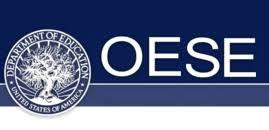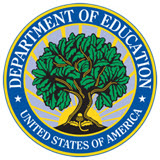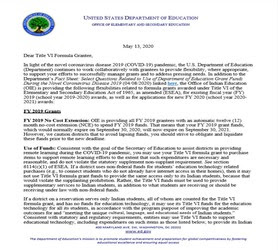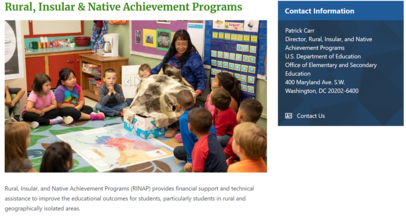
June 2020, Volume 1, Issue 5
Office of Elementary and Secondary Education
Office of State Grant and Program Support Newsletter

From the Deputy Assistant Secretary
Letter From Ruth Ryder, Deputy Assistant Secretary for the Office of State Grant and Program Support

Dear Partners and Stakeholders:
Once again, our newsletter is focused on resources to support you during this challenging time. We know that you are all shifting gears to ensure that children are getting the best education possible, often in a remote learning environment, while also ensuring that staff, teachers, and leaders everywhere are safe. We are looking for ways to best support you and are in the midst of a series of listening sessions. I had the opportunity to sit in on the first few sessions and was heartened to hear the many innovative strategies implemented to ensure continuity of learning. When asked what we could do to help, several participants said offering this opportunity for state staff to share strategies and learn from each other was of great value. We appreciate those of you who participated, and who will participate in future listening sessions, for informing us of the many ways you have adjusted your work to best support students and families.
Below you will find details about two fact sheets that we issued in May. The first addresses identifying and serving migratory children while ensuring the health and safety of staff and migratory families. The second focuses on assessing the needs and progress of English learners during this unprecedented time. In addition to the fact sheets, we issued a letter that describes several flexibilities available to Indian Education formula grantees in completing their application for funds.
I would also like to draw your attention to two discretionary grant competitions. Well-Rounded Education through Student Centered Funding Demonstration Grants will provide grants to local educational agencies (LEAs) to develop model student-centered funding systems. Expanding Access to Well-Rounded Courses Demonstration Grants will provide grants to state educational agencies (SEAs) to provide well-rounded educational opportunities through course-access programs. Information about how to submit applications for these grant programs is provided below.
We are continuing to work closely with our technical assistance centers, both within our office as well as across the Department, to better understand your needs at this time. Please let us know if you have thoughts about how our technical assistance centers can best support you in the coming months.
All the best –
Ruth Ryder
|

COVID-19 Resources for Educators

Fact Sheet: Addressing the Risk of COVID-19 While Serving Migratory Children
The Office of Migrant Education’s Fact Sheet: Addressing the Risk of COVID-19 While Serving Migratory Children can assist SEAs and local operating agencies (LOAs) as they determine how to identify eligible migratory children and provide services to address their needs, while taking into consideration the health, safety, and well-being of staff and migratory families. To access the fact sheet, along with additional information and guidance related to the COVID-19 pandemic, please see https://www.ed.gov/coronavirus.
|


Fact Sheet: Providing Services to English Learners During the COVID-19 Outbreak
On May 18, the Department released a fact sheet on English learners (ELs) that answers several questions that SEAs and LEAs have frequently raised in the past few weeks. The fact sheet covers a number of topics, including assessing the needs and progress of ELs, requirements for providing services to ELs, allowable uses of funds, and communicating with parents of ELs. The document is intended to provide useful information regarding the interpretation by the Department of the applicable statutory and regulatory requirements in the context of the specific facts presented and is not intended to establish new requirements or new rights.
|


CARES Act Update
As part of its work to implement the Coronavirus Aid, Relief, and Economic Security (CARES) Act, the Department has published applications and begun awarding grants under four grant programs: Education Stabilization Fund Discretionary Grants; Governor’s Emergency Education Relief Fund; Elementary and Secondary School Emergency Relief Fund; and Higher Education Emergency Relief Fund. Below are the number of formula grant awards made as of May 31:
- Elementary and Secondary School Emergency Relief Fund (ESSER)
- 50 states have received grants
- Governor’s Emergency Education Relief Fund (GEER)
- 34 states have received grants
- Formula Grants to Outlying Areas
- Education Stabilization Fund-Governors (ESF-Governors): 1 Outlying Area has received a grant
- Education Stabilization Fund-State Educational Agency (ESF-SEA): 3 Outlying Area have received grants
|


Office of Indian Education Formula/Title VI Flexibilities Letter – COVID-19
Last month, the Office of Indian Education (OIE) released a flexibilities letter that was developed to provide detailed responses to Title VI COVID-19 questions from grantees. The letter can be found here.
|


Comprehensive Center Network COVID-19 Education Resource Repository Continues to Expand
The Comprehensive Center Network has continued to gather and curate education resources related to COVID-19 to facilitate continuity of learning. The Network recently added five new resource collections and now features eight collections in total. The collections include tools to ensure equity and to support social emotional learning, as well as resources for school leaders, LEAs, SEAs, and much more. Click here to access the collections.
|


National Center for Systemic Improvement Webinar Series: Strategic Resource Management in Response to COVID-19
Throughout May, the National Center for Systemic Improvement (NCSI), funded by the Department’s Office of Special Education Programs (OSEP), presented a multipart webinar series that featured best practices for state special education leaders to make the best use of available resources during the COVID-19 pandemic. NCSI and invited experts shared information to help state leadership teams make informed decisions amid current circumstances. Attendees received guidance on budget changes, how to direct the effective use of CARES Act funding, strategies for comprehensive planning across programs, tips for leveraging education resources, and understanding of funding flexibilities. Click here to access the webinar slides, recordings, and transcripts.
|


The IRIS Center: Strategies for Parents on Supporting Learning During the COVID-19 Pandemic
The IRIS Center, also funded by OSEP, recently released a learning module entitled “Parents: Supporting Learning During the COVID-19 Pandemic.” This resource offers parents tools and strategies for supporting their child’s learning at home during school shutdowns caused by the COVID-19 pandemic. It is intended to help parents better understand their role in supporting their child’s learning, how to prepare for learning at home, how to support learning in reading and math, ways to foster social and emotional wellness, and how to support learning for children with disabilities. Click here to access the module.
|


CARES Act Temporary Job Opportunities
The Office of Personnel Management has issued guidance to permit federal agencies to hire temporary staff to respond to the COVID-19 pandemic. Under the hiring flexibilities granted, the Department is hiring 16 temporary employees to work on Cares Act programs in OESE.
Anyone who is interested in a one year appointment can send their resume to caresactjobs@ed.gov for consideration.
|

Monthly Office Spotlight: Office of Rural, Insular & Native Achievement Programs

The Office of Rural, Insular, and Native Achievement Programs (RINAP) provides financial support and technical assistance to improve the educational outcomes of students, particularly students in rural and geographically isolated areas. Programs administered by this office are detailed below.
Alaska Native Education and Native Hawaiian Education Programs: These programs provide resources to meet the unique needs of Alaska Native and Native Hawaiian students. Grantees under the Alaska Native Education program use their funds for activities such as the development of curricula and education programs that address the education needs of Alaska Native students and the development and operation of student enrichment programs in science and mathematics. The purpose of the Native Hawaiian Education program is to develop innovative education programs to assist Native Hawaiians and to supplement and expand programs in the area of education.
Consolidated Grants to the Insular Areas and Republic of Palau Grant: The Insular Areas (American Samoa, the Commonwealth of the Northern Mariana Islands, Guam, and the U.S. Virgin Islands) administer consolidated grants in order to improve teaching and learning by encouraging greater cross-program coordination, planning, and service delivery, while enhancing integration of programs with educational activities carried out with state and local funds. The Republic of Palau uses funds reserved under the Elementary and Secondary Education Act of 1965 (ESEA) for teacher training, curriculum development, instructional materials, general school improvement and reform, and direct educational services.
Rural Education Achievement Program: The Rural Education Achievement Program (REAP) is designed to help rural school districts that may lack the personnel and resources to compete effectively for federal competitive grants and that often receive grant allocations in amounts that are too small to be effective in meeting their intended purposes.
Visit the RINAP website to learn more about these programs.
|

Technical Assistance Resources and Updates

Engaging Stakeholders in Financial Transparency Resources
Recently, the State Support Network released a blog series entitled “District Perspectives on Engaging Stakeholders in Financial Transparency.” Featuring insight gained from the superintendent for Community Unity School District 300 in Illinois, this blog series is designed to help local leaders reflect on financial transparency efforts related to reporting per-pupil expenditure data. Blog 1 focuses on the benefits of engaging stakeholders in financial transparency efforts, Blog 2 highlights engagement strategies districts can use, and Blog 3 addresses data visualization approaches several districts use when sharing financial data with stakeholders.
|

Department Releases Final Title IX Rule
On May 6, the Department released its Final Rule under Title IX of the Education Amendments of 1972, which prohibits discrimination on the basis of sex in education programs or activities receiving federal financial assistance. The rule strengthens Title IX protections for survivors of sexual misconduct and restores due process in campus proceedings to ensure that all students can pursue an education free from sex discrimination. The new Title IX regulation holds schools accountable for failure to respond equitably and promptly to sexual misconduct incidents and ensures a more reliable adjudication process that is fair to all students. More Title IX details and resources are available here.
|

Upcoming Due Dates and Events
Due Dates and Competitions

Impact Aid Application Amendment Deadline Extension!
The Impact Aid 7002 and 7003 application amendment deadline is now extended to August 31.
If your district completed the FY 2021 Impact Aid Program application and needs to make a correction or update, it may now do so until August 31. Now is the time to check your application in the Impact Aid Grant System (IAGS) to ensure all of the information is reported correctly. Visit our portal to find our video and user guide to get started right away. Help is available by phone at (202) 260-3858 or email at Impact.Aid@ed.gov.
|

Notice Inviting Applications: Expanding Access to Well-Rounded Courses Demonstration Grants
On April 27, the Department issued a notice inviting applications for fiscal year 2020 for the Expanding Access to Well-Rounded Courses Demonstration Grants program. This program provides competitive grants to SEAs to demonstrate models for providing well-rounded educational opportunities through course-access programs (as defined in the notice).
The deadline for transmittal of applications is June 26.
For more information about this grant opportunity please contact Elyse Robertson, (202) 260-0931 or courseaccess@ed.gov.
|

Notice Inviting Applications: Competitive Grants for State Assessments.
On May 1, the Department issued a notice of final priorities and a notice inviting applications for the Competitive Grants for State Assessments program. The purpose of this program is to enhance the quality of assessment instruments and assessment systems used by states for measuring the academic achievement of elementary and secondary school students. It is authorized by section 1203(b)(1) of the ESEA.
Applications are due June 30.
For more information about this grant opportunity please contact Don Peasley at ESEA.Assessment@ed.gov.
|

Notice Inviting Applications: Well-Rounded Education Through Student-Centered Funding Demonstration Grants.
On May 11, the Department issued a notice inviting applications for the Well-Rounded Education Through Student-Centered Funding Demonstration Grants program. This program will provide grants to LEAs to demonstrate model programs through the development and implementation of student-centered funding systems based on weighted per-pupil allocations under section 1501 of the ESSA. The grants will allow school districts to plan for and implement a funding system that allocates resources, including eligible federal funds, to schools based on the number of students and the corresponding level of need.
Applications are due July 10.
For more information about this grant opportunity, please contact Denise Joseph at WeightedFundingPilot@ed.gov.
|

Notice Inviting Applications: School-Based Mental Health Services Grant Program
In the Department’s FY 2020 appropriations, Congress increased funding for the School Safety National Activities program, and included direction in the Explanatory Statement that funds be used to increase the number of counselors, social workers, psychologists, or other service providers who provide school-based mental health services to students.
The School-Based Mental Health Services Grant program will provide competitive grants to SEAs to increase the number of qualified mental health service providers that provide school-based mental health services to students in LEAs with demonstrated need. The notice inviting applications was published on May 28.
The deadline for transmittal of applications is July 13.
For more information about this grant opportunity please contact Amy Banks, (202) 453-6704 or OESE.School.Mental.Health@ed.gov.
|

Notice Inviting Applications: State Tribal Education Partnership Grants to Tribal Educational Agencies
On June 1, the Department issued a notice inviting applications for FY 2020 for the
![]()
About the Author
Ruth Ryder is the Deputy Assistant Secretary for the Office of Office of State Grant and Program Support in the Office of Elementary and Secondary Education (OESE) at the U.S. Department of Education. In this role, Ms. Ryder oversees a broad range of management, policy, and program functions related to formula and discretionary grant programs under the Elementary and Secondary Education Act, as amended by the Every Student Succeeds Act (ESEA). Ms. Ryder was previously the deputy director of the Office of Special Education Programs in the Office of Special Education and Rehabilitative Services, which she joined in 1988. Prior to joining the Department, Ms. Ryder was a program administrator in a Washington state school district. There she had responsibility for the Elementary and Secondary Education Act Title 1 and Title II programs, state-remediation, gifted education, outcome-based education, and state- and district-wide testing programs. Ms. Ryder has a bachelor’s degree in psychology and elementary education and a master’s degree in special education.
Read next
Policy
Letter from Principal Deputy Assistant Secretary Schott re: ARP Administrative Funds Waivers
USED & White House
U.S. Department of Education Releases Final Title IX Regulations, Providing Vital Protections Against Sex Discrimination
USED & White House
OMB Announces New Final UGG
| |





















